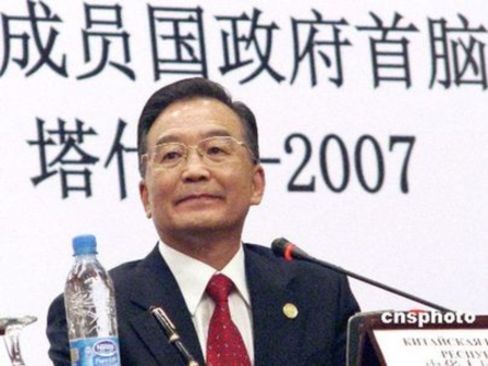By Yang Jiechi
Editor's note: Yang Jiechi, China’s minister of foreign affairs, recently wrote an article to commemorate the seventh anniversary of the founding of the Shanghai Cooperation Organization (SCO). China.org.cn translated the article into English as follows.
 The leaders of the six member nations signed a series of documents, including a communiqué, and met the press after a session of the Shanghai Cooperation Organization (SCO) held in the capital of Uzbekistan on November 2, 2007. The photo shows the scene where Chinese Premier Wen Jiabao meets the press.(Photo:cnsphoto)
The leaders of the six member nations signed a series of documents, including a communiqué, and met the press after a session of the Shanghai Cooperation Organization (SCO) held in the capital of Uzbekistan on November 2, 2007. The photo shows the scene where Chinese Premier Wen Jiabao meets the press.(Photo:cnsphoto)
On June 15, 2001, China, Russia, and four of their central Asian neighbors, Kazakhstan, Kyrgyzstan, Tajikistan and Uzbekistan, established the Shanghai Cooperation Organization (SCO), which is considered a new regional group in pursuit of security and cooperation on an open basis.
The SCO’s member nations account for three-fifths of Eurasia’s land and a quarter of the world’s population. Because it unites the world’s largest country, Russia, and the world’s fastest growing nation, China, the organization attracts significant attention from the international community.
Over the last seven years, the SCO has become a major factor in strengthening the mutual trust, cooperation and regional security between its member nations. The following is a review of the SCO’s activities.
1. Security cooperation aiming to defuse fallout from the Cold War. Two mutual trust and disarmament pacts were signed by the Shanghai Five, the organization that preceded the SCO before 2001. These were deemed helpful in paving the way to further genuine cooperation. Since the SCO’s founding, its member nations have supported each other in the common concerns of independence, sovereignty and territory. In August 2007, the six nations signed the “Treaty on Good Neighborly Friendship and Cooperation,” signaling that collaborative efforts have increased and reached a higher level.
2. Security cooperation has been furthered to maintain regional stability. With mutual trust deepened, security cooperation has assumed greater prominence. The member nations periodically conduct bilateral and multilateral anti-terror drills, as well as other joint activities.
3. Budding economic cooperation has yielded tangible results. The SCO has brought the six nations much closer economically. In September 2003, a framework agreement on multilateral trade, which specified development objectives and set out concrete measures, was signed by the six member nations. Currently, the SCO has initiated some 20 large-scale projects related to transportation, energy and telecommunication. From 2003 to 2007, the trade volume between China and the other five nations increased 3.4 times, and the number of road border crossings between China and the other five nations has risen to 25.
4. Longstanding friendship is grounded by cultural activities. Cooperation among the six nations in education, culture, hygiene, sports, emergency relief, environmental protection, travel and youth exchange programs is underway. Festivals, youth camps, sports meetings and exhibitions in the name of the SCO have also won increasing acclaim.
5. The SCO gains more influence in the international community as more nations seek to join the group. It has granted Mongolia, Pakistan, Iran and India observer status. Afghanistan is currently a member of the SCO-Afghanistan contact group. The SCO also has a close connection with other significant international organizations. Turkmenistan’s president was invited to the SCO summit for the first time last year, a telling reflection of its power to draw disparate outsiders.